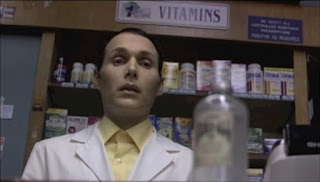Polish Cinema: Vabank (Juliusz Machulski, 1981, Poland)
Vabank is a unique film for what it represents - an embrace of commercial cinema in a country that is most known for its prestige pictures and arthouse classics. The film proved to be an immense success not only in Poland but elsewhere in the Soviet Union, even spawning a sequel in 1984. Juliusz Machulski, the director of the film, has carved out a career for himself in this space, making a number of films that were both critically acclaimed and wildly successful with audiences, including Sexmission (1984) - his followup to Vabank. The film is a Polish take on American gangster films, no doubt inspired by The Sting. It takes place in Warsaw in 1930s pre-war Poland (though the film was shot in Lodz), and showcases the opulent side of Polish life at this time. For this alone, the film is worth watching - Machulski and his production designers are keen to include details, including advertisements from the time period.
The film tells the story of Henryk Kwinto, an experienced safecracker who has just been released from prison. Kwinto is enlisted by two younger thieves - Nuta and Moks - to be part of a large heist. In the process, Kwinto will be able to get revenge on Kramer - the man who got him into jail in the first place. While the plot is relatively simple, much of the film's charm comes from its sense of dark humor. While many of the jokes will be lost on viewers who are not fluent in Polish, Kwinto - played by director Juliusz's father Jan - captures this sense of humor in his performance.
Vabank stands out in contrast to other Polish films from the time period in its sense of escapism. At the time of its release, Poland had entered martial law and was on the brink of civil war, but you wouldn't know this from watching.
7/10
This post may contain affiliate links. We make a small commission if you buy the products from these links (at no extra cost to you). As an Amazon Associate, I earn from qualifying purchases. But we only recommend products we would use ourselves.




Comments
Post a Comment